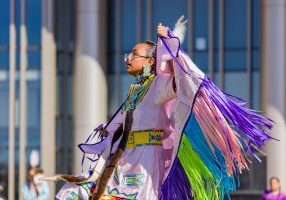“It’s our Fourth of July!” Celebrating Juneteenth When the Rest of the Country Catches Up…
June 15, 2023
by Charlene Y. Taylor, PhD, VP of Consulting Services
 Even though I grew up in Alaska, my family has very southern roots. I was born in Miami, Florida where both my parents were also born and raised. Being military, my family had friends from all over the country with varied backgrounds, so although I grew up in a place that most do not think of as very diverse, I had a very strong, very present Black community during my formative years. Black music, Black church, Black culture, and Black history were ever-present in my house and in the homes of the other Black kids that I knew. I knew about MLK and Rosa Parks long before my teacher presented them in class during Black History Month. But, thanks to my parents and the other elders in my life, I also knew about Medgar Evars, Malcolm X, Black Wall Street, Althea Gibson, Gordon Parks, Bessie Coleman, and a list of other notable people and events in Black history I only knew as “history.”
Even though I grew up in Alaska, my family has very southern roots. I was born in Miami, Florida where both my parents were also born and raised. Being military, my family had friends from all over the country with varied backgrounds, so although I grew up in a place that most do not think of as very diverse, I had a very strong, very present Black community during my formative years. Black music, Black church, Black culture, and Black history were ever-present in my house and in the homes of the other Black kids that I knew. I knew about MLK and Rosa Parks long before my teacher presented them in class during Black History Month. But, thanks to my parents and the other elders in my life, I also knew about Medgar Evars, Malcolm X, Black Wall Street, Althea Gibson, Gordon Parks, Bessie Coleman, and a list of other notable people and events in Black history I only knew as “history.”
With that context, you can imagine my surprise when, in fourth grade, I learned that none of my white friends had heard of Juneteenth, much less knew its significance. I had grown up going to events like plays, musicals, and parades to celebrate a holiday that was held up as monumental in the Black community. Yet, outside of my family and family friends, no one in my life knew about it.
The implications of that information gap – the realization that, in so many ways, the Black experience was still very separate from (and by extension, less important than) the rest of America – was a hard pill to swallow at the age of 10. I was reminded of that lesson when I took an African American history class in college and learned things that even my parents and church hadn’t told me about. I called my mother as an indignant 18-year-old, demanding to know why I never learned these things in school. I remember my mother saying “Did you really think all the amazing things we have done could be reduced to one month?” I recall feeling a mixture of anger that it took so long, but relief that people were finally starting to see, to learn, to understand.
I felt that same mixture of feelings when the Juneteenth National Independence Day Act was signed into law on June 17, 2021. Frustrated, yet happy. Dubious, yet hopeful. Hopeful that this move toward educating people about ALL of American history is a preliminary step toward greater understanding and a deeper appreciation for all the squares that make up the quilt of America’s history.
I invite everyone to spend some time digging into the histories, not just of Juneteenth, but of all contributions of the communities and groups whose histories have been minimized in the telling of the story of America. I promise, you will be surprised at what you learn.

Honoring Indigenous Justice on Indigenous Peoples’ Day 2025
RDA Consulting observes Indigenous Peoples’ Day annually in place of the Columbus Day Federal holiday. First observed in Berkeley, California in 1992, the celebration of Indigenous Peoples’ Day has spread across the United States. Today, 17 states, the District of Columbia, Puerto Rico, and numerous localities nationwide celebrate Indigenous Peoples’ Day on the second Monday…

Supporting Juneteenth and Abundant Opportunities
We know that poverty disproportionately affects Black women and children in the US, which compounds disparities in maternal and child health. These disparities, an effect of systemic racism, are further exacerbated by social and economic stressors. The results of poverty, including lack of safe housing and access to healthy food, and the stress created by…